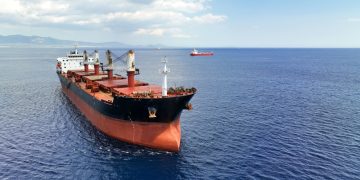The world’s first pilot plant for the cost-efficient production of green methanol was inaugurated in the Leuna Chemical Park as part of the Leuna100 project.
As explained, behind it is Fraunhofer Institute for Wind Energy Systems IWES, Fraunhofer Institute for Environmental, Safety and Energy Technology UMSICHT, DBI – Gastechnologisches Institut gGmbH Freiberg, and the Technical University of Berlin (TU Berlin).
The goal is to utilize a fundamentally new production process to enable the cost-efficient market ramp-up of green methanol and thus offer the container shipping industry a climate-neutral alternative fuel.
Green methanol production is based on a synthesis gas of carbon monoxide and green hydrogen – hydrogen produced with renewable energy. The process for green methanol production in the Leuna100 project is composed of three steps: synthesis gas production, methanol production, and purification of the crude methanol produced.
The pilot plant sees two different technologies coupled for the CO2-based production of synthesis gas: Fraunhofer UMSICHT is providing new, low-temperature co-electrolysis, while DBI – Gastechnologisches Institut gGmbH Freiberg utilizes a reverse water gas shift (RWGS) unit. C1 is delivering the groundbreaking catalyst as well as a reactor developed in-house for the homogeneous catalysis of methanol. Fraunhofer IWES is providing the location and infrastructure at the Hydrogen Lab Leuna and evaluating the load flexibility. TU Berlin is developing an efficient, load-flexible operating concept on the basis of a dynamic overall process model.
The project is being funded by the German Federal Ministry for Digital and Transport (BMDV) with a total of €10.4 million over the next three years. Tankers, container ships, and cruise liners are currently responsible for almost three percent of global annual CO2 emissions. The new climate strategy adopted by the International Maritime Organization in summer 2023 envisages reaching the goal of climate neutrality by around 2050.
Emissions should be reduced by at least a fifth compared with 2008 by 2030 and even by at least 70 percent by 2040. Large shipping companies such as Maersk have already ordered methanol-compatible vessels, the first of which are already in use. Renewable fuels based on green hydrogen and CO2 also represent an alternative for the aviation industry. A further processing step involving the alcohol-to-jet (ATJ) process allows the potential production of kerosene from green methanol.
With our many years of scientific expertise and a complex research infrastructure for renewable energies, including the Hydrogen Lab Leuna, Fraunhofer IWES is the ideal partner for the successful realization of projects for the production of green fuels for the shipping and aviation industries.
..said Prof. Dr. Andreas Reuter, Managing Director Fraunhofer IWES.


































































